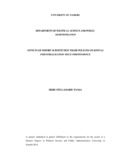| dc.contributor.author | Ireri, Stellamarie W | |
| dc.date.accessioned | 2016-04-29T07:29:59Z | |
| dc.date.available | 2016-04-29T07:29:59Z | |
| dc.date.issued | 2014 | |
| dc.identifier.uri | http://hdl.handle.net/11295/95347 | |
| dc.description.abstract | This study examines the effects of Import Substitution trade policies on Kenya’s
industrialization since independence. The general objective of the study is to find out
the effects that Import Substitution trade policies had on the structure of the
manufacturing sector, income distribution, employment creation and the operations of
multinational corporations in Kenya. The study assumes that Import Substitution trade
polices as an industrialization strategy remains viable and of great importance for less
developed countries.
The study has utilized both primary and secondary data. While primary data will
be generated through interviews, secondary data will be obtained from books,
journals, magazines and official publications by the government. A conceptual
framework has been adopted in the study so as to help the researcher make sense of
the problem statement of the study.
The study tentatively concludes that the type of industrialization that occurred did
not lead to a structural transformation of the Kenyan economy. The structural change
was to be brought about by creating gaps in the process of eliminating imports and
making investment possible in the Non-Traditional sectors. However resources were
concentrated on a small part of the economy and to a large extent neglected others and
in particular agriculture. Consequently Import Substitution did not lessen Kenya’s
external dependency but merely changed its nature. The considerable outflow of
dividends and other payments for instance foreign investors made Kenya rely more on
imports in order to achieve further industrial growth.
This deprived the country of the first learning steps in the industrialisation process
and in building manufacturing capacity and capabilities. Thus industries worked
below their full capabilities. Therefore the government needs to reconsider and
concentrate on neglected industries with of course putting in mind the lessons learnt
from past mistakes from the first regime of Import Substitution trade policies. The
paper also emphasizes the need for the government to continue pursuing policy
measures that strategically focuses on the growth of the sector by taking into account
their backward and forward linkages in the economy. | en_US |
| dc.language.iso | en | en_US |
| dc.publisher | University of Nairobi | en_US |
| dc.rights | Attribution-NonCommercial-NoDerivs 3.0 United States | * |
| dc.rights.uri | http://creativecommons.org/licenses/by-nc-nd/3.0/us/ | * |
| dc.subject | import substitution trade policies | en_US |
| dc.title | Effects of import substitution trade policies on kenyas industrialisation since independence | en_US |
| dc.type | Thesis | en_US |



